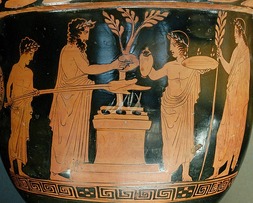 Guest Post by WWP intern Vincent Barraco Despite what all those black and white photos with overlaid text on your Facebook feed say, human beings love drama. Secondhand drama, the type that doesn’t affect our lives, is what made the Kardashians a household name. Judge Judy and Maury Povich haven’t achieved decades of television stardom on their good looks and personalities alone. A good dollop of drama has left the lips of orators for centuries, touched countless written pages and television screens, and yet has still left human beings wanting more. There are no secrets, then, to how Greek mythology enjoys its pervasive appeal in the 21st century. Zeus’s infidelities are so numerous that not even Dr. Phil’s good ol’ downhome wisdom could fix his marriage — but I’d cancel any plans and set my DVR to ‘record’ if Dr. Phil wanted to give it a shot. The Greeks loved their gods smack in the middle of juicy drama, and they didn’t pull any punches. The sons and daughters of the gods commit taboos of murder and incest that not even Game of Thrones can compete with. With all of its drama and intrigue, Greek mythology would be greenlit for as many seasons as The Simpsons if it were a hit television series. The best part about enjoying the dramas of Greek mythology in the 21st century is the accessibility of the themes and characters. Zeus, Athena, and Hades are known characters, even by those who have never read up on Greek mythology. Medusa and Herakles are referenced in literature, shows, and movies, appearing in all shapes and sizes. These known characters can be reworked and restyled for modern times, enjoyable for any age and generation, with a new look but a comfortable, familiar feel, like a re-purposed favorite shirt. These timeless characters can appear in any form and still hold their original connotations. Athena can appear as only a symbol of wisdom in a character’s dream or she can be reborn into a librarian living in the 21st century, discovering her own past life and fighting over the best parking spot at the rec center with Poseidon, the aspiring professional swimmer. I feel like I already know how these characters would bicker — and I love it.  This will ring true and very familiar to those who engage in reading and writing fanfiction. Some days I feel ready to plow through HP Lovecraft and all his monsters, worlds, and intricacies — but some days I want to feel the warmth in my chest that comes when two characters I already love quarrel for the hundredth time. Greek mythological characters and creatures conjure images, stories, dynamics, and other connotations with just the mention of a name. These expectations can be safely subverted, reshaped, and marvelously transformed to reinvent beloved characters and thrust them into new adventures. It’s the original lore in Greek mythology that lends itself to such memorability and persistence throughout multiple cultures and centuries. Epic battles, arranged marriages, passionate loves, and tragic sacrifices never cease to enthrall and move us to feel. Like Prometheus’s struggle to give humanity the gift of fire, there are rarely happy endings, but the good guy’s agony keeps us rooting for the next Prometheus with a worthy cause. Journey stories, like that of Herakles, inspire us to move up and onward with our own passage through life. The gods may be leagues above us, immortal, and know power we can’t imagine — but there’s something tangible about their lives that leaves an impact. The impact that drama leaves on us is somehow addicting — maybe it’s watching others fight against conflicts and vices we can relate to, or maybe it’s schadenfreude we feel when characters make the mistakes we would make and let loose the raw emotions we hate to succumb to. The way we hate drama when it happens to us, and then read or watch drama happening to someone else is a testament to how very human drama is. Alfred Hitchcock said: “What is drama but life with the dull bits cut out.” So keep posting to your Facebook about how your page is a drama-free zone, then go lurk on your ex’s Twitter to see if anything juicy has happened, and finally settle down with a good book about the Greek dramas, guilt-free in your knowledge that humans have been enjoying them for centuries. Embrace drama, just keep it where it safely belongs: in your favorite book, not happening to you. Vincent Barraco is working towards his B.F.A. in Creative Writing at Bowling Green State University in Ohio. He is the Editor-in-Chief of Prairie Margins, BGSU's undergraduate literary magazine. As a double minor in Japanese and Marketing, he spends his rare free time reading Japanese literature, correcting Food Network stars on the pronunciation of panko, and dancing with a tiny poodle. He has been published in Zaum Press and The Emerson Review.
0 Comments
Your comment will be posted after it is approved.
Leave a Reply. |
World Weaver PressPublishing fantasy, paranormal, and science fiction. Archives
February 2024
|
- Home
-
Books
-
All Books
>
- Beyond the Glass Slipper
- Bite Somebody
- Bite Somebody Else
- Black Pearl Dreaming
- Cassandra Complex
- Causality Loop
- Clockwork, Curses, and Coal
- Continuum
- Corvidae
- Cursed: Wickedly Fun Stories
- Dream Eater
- Equus
- Fae
- Falling of the Moon
- Far Orbit
- Far Orbit Apogee
- Fractured Days
- Frozen Fairy Tales
- Glass and Gardens: Solarpunk Summers
- Glass and Gardens: Solarpunk Winters
- Grandmother Paradox
- Grimm, Grit, and Gasoline
- Haunted Housewives
- Heir to the Lamp
- He Sees You When He's Creepin': Tales of Krampus
- Into the Moonless Night
- Jack Jetstark's Intergalactic Freakshow
- King of Ash and Bones (ebook)
- Krampusnacht
- Last Dream of Her Mortal Soul
- Meddlers of Moonshine
- Mothers of Enchantment
- Mrs Claus
- Multispecies Cities
- Murder in the Generative Kitchen
- Recognize Fascism
- Scarecrow
- Sirens
- Shards of History
- Shattered Fates
- Skull and Pestle
- Solarpunk (Translation)
- Solarpunk Creatures
- Solomon's Bell
- SonofaWitch!
- Speculative Story Bites
- Trenchcoats, Towers, and Trolls
- Weredog Whisperer
- Wolves and Witches
- Anthologies and Collections
- Novels
- Novellas
- Fairy Tale
- Fantasy
- Romance
- Science Fiction
- Urban/Contemporary Fantasy
- Young Adult SFF
-
All Books
>
- Blog
- About
- Contact
- Press / Publicity
- Newsletter Signup
- Privacy Policy
- Store

 RSS Feed
RSS Feed